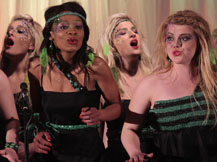 |
Marjolein
Photo: Albert van Biljon
3 September 2012 |
The best Sêr yet. This was the opinion of those who attended the ATKV’s national Sêr competition on the Bloemfontein Campus on Saturday 1 September 2012.
The competition, an annual event between the universities of Stellenbosch, Pretoria, Johannesburg, the UFS and the North-West University, had the social network Twitter abuzz and was one of the trending topics on this network.
“Sêr is coming home,” presenters of the TV programme MK Kampus Sêr told the audience in the Callie Human Centre before male and female groups from the participating universities took to the stage. The competition was first presented at Kovsies in 1997, with university residences showcasing their singing and entertainment talents.
On Saturday evening the Stellenbosch University took top honours. The male and female groups from this university’s Hippokrates residence took the top spots.
The Kovsies name was held high by Marjolein (female) and Veritas (male) who obtained a second and third place respectively. Marjolein further impressed by winning the prize for the best own composition in the female category.